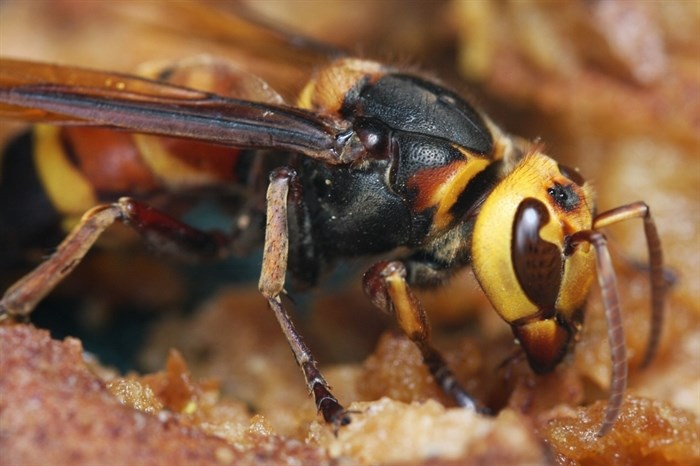
Image Credit: Wikipedia Commons
May 09, 2020 - 7:00 AM
The Asian giant hornets nicknamed “murder hornets” found in B.C. last year — including a possible sighting in Kamloops — and most recently in Washington State may be spreading along train routes — not boats, says a B.C. expert.
Experts originally focused on bodies of water where the nests were found, as the hornets would have arrived from Asia to North America but more recently experts have tied the nests found recently in Washington and in the Lower Mainland to train tracks. Last year, a possible sighting of the hornet was reported east of Kamloops, which has a main CN Rail line running through it, although the case was never confirmed, Paul van Westendorp, provincial apiculturist, said.
The world’s largest hornets pose a risk to both the native honey bee population — they have no defence against the apex predator’s giant mandibles — as well as humans. Their stings can be lethal if stung enough times and they are responsible for dozens of human deaths every year. Honey bee populations are already on the decline worldwide.
READ MORE: More 'murder hornets,' with sting that can kill, found near B.C.
“They are widely regarded as being a highly adaptable species, therefore it would not be surprising if they could establish themselves certainly here on the West Coast. The tolerance level for them in colder climates seems to be OK, but clearly they strongly favour maritime climate conditions and forested areas,” van Westendorp said.
The likelihood of them settling in the Interior remains unknown, but unlikely, he said.
The hornets would have come here from Asia, from ships and imported goods, but “what makes it interesting, is the samples that were collected in Nanaimo and Washington were from two different strains,” he said.
“So now we’re starting to look at all those shipments of materials and the transfer of these to containers (on) trains,” van Westendorp said.
However, “these hornets are not expected to travel far and wide and quickly, the coastal range is a very formidable barrier, but man-made activities probably contribute to the spread,” he said.
As a forest dweller and ground nester, the prairies are a huge physical barrier to prevent the natural spread of these hornets across Canada, but other environmental conditions, like if it can reproduce successfully, the types of prey available and how well it adapts to the vegetation, will play roles in how the giant hornets adapt.
“We should be concerned” because it poses a health risk, and it’s classified as a serious honey bee predator that could have an impact on honey bees in B.C., van Westendorp said.
READ MORE: Invasive giant bee-eating hornets nest found in Nanaimo, B.C.
Roughly 30 to 50 people in Japan die a year after accidentally disturbing a hornet’s nest, he said. The giant hornets are native to Japan, Korea and eastern parts of China.
However, since the hornet is large, worker hornets are approximately 3.5 centimetres in length and Queens can be up to four to five cm in length with a wingspan of four-seven cm, beekeepers can protect their hives using screens, he said.
He compared the hornets to polar bears. Walking around in the Arctic, people don’t really worry about bears unless they come across one. It’s the same for giant hornets.
The nests found so far are believed to be accidental incursions due to shipments of materials from Asia to North America so “these kinds of incidents will occur in the future. I think our vigilance will have to increase to prevent any of these pests to establish themselves.”
To contact a reporter for this story, email Carli Berry or call 250-864-7494 or email the editor. You can also submit photos, videos or news tips to the newsroom and be entered to win a monthly prize draw.
We welcome your comments and opinions on our stories but play nice. We won't censor or delete comments unless they contain off-topic statements or links, unnecessary vulgarity, false facts, spam or obviously fake profiles. If you have any concerns about what you see in comments, email the editor in the link above.
News from © iNFOnews, 2020